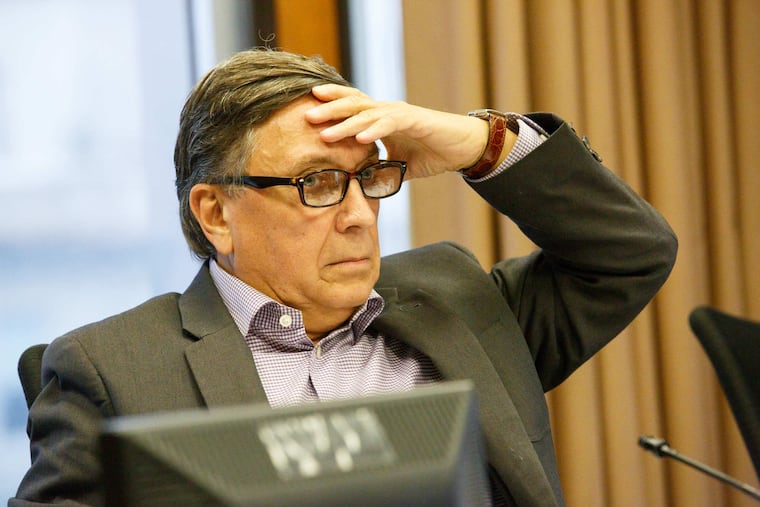Philadelphia is shifting back to in-person meetings for land-use and planning decisions
After almost five years of remote board and commission meetings, Philadelphia is bringing in-person zoning board and Historical Commission meetings back.

At September’s meeting of the Philadelphia Land Bank, dozens of attendees crammed into the meeting room on the 17th floor of 1234 Market St. for the first time since 2020.
Apparently the appetite for in-person meetings of obscure municipal boards is stronger than ever. There was barely an empty seat in the house, and latecomers had to clamber over other attendees to secure a chair.
In a sudden reversal of COVID-era norms, there was no option to watch, let alone participate, remotely.
Similar changes are coming soon to other municipal bodies under the umbrella of the Department of Planning and Development, although some online access options will be retained.
“The boards and commissions staffed by the Department of Planning and Development are working toward a format of in-person meetings with an option for members of the public to join and, as appropriate, participate, virtually,” Karen Guss, a spokesperson for the city, wrote in a message to The Inquirer.
The new hybrid model will apply to bodies like the Zoning Board of Adjustment, the Historical Commission, and the Planning Commission, which routinely draw intense interest from neighborhood groups, preservationists, developers, and housing advocates.
Meeting rooms at the top of the One Parkway municipal office tower — where the Department of Planning and Development’s commission and board meetings have historically taken place — are being outfitted with the necessary equipment. Guss says policies and procedures for hybrid meetings are still being developed.
The Land Bank operates in a different building and will continue to be in-person only after the sudden September transfer away from remote meetings, although Guss says “a virtual viewing option” is possible in future.
Plans for the other boards and commissions housed outside the Department of Planning and Development — such as the Board of Tax Revision and the Board of Licenses and Inspections Review — are not yet clear. A city spokesperson did not respond to a request for comment.
Guss did not provide a date for when the in-person meetings would begin again, but several parties who regularly testify at such hearings told The Inquirer that they have been informed the new model will begin in 2025.
“It’s obvious to anyone who’s been practicing in front of the boards and commissions that remote hearings add to a lengthier period of time and delays,” said Matt McClure, leader of Ballard Spahr’s zoning and land-use team.
The Zoning Board of Adjustment in particular saw wait times balloon during the pandemic. Critics like McClure partly blamed remote meetings for making it harder to hash out deals and claimed other time-saving measures could not be employed. Wait times have since been reduced because the number of cases has shrunk as high interest rates and other factors have chilled construction activity.
“It will also lower the temperature when people get to talk in person and see each other, and you can have conversations in the hall,” McClure said. “It makes it easier to make compromises when people are talking to each other, as opposed to yelling at each other through the [Zoom] boxes.”
McClure notes that other municipalities he deals with in Pennsylvania returned to in-person zoning and planning meetings years ago. To his knowledge, Philadelphia is the last to still be fully remote.
Under Mayor Jim Kenney, the department argued that preserving remote meetings would allow greater access for those who found it challenging to travel to Center City for scheduling or accessibility reasons.
But Mayor Cherelle L. Parker is an advocate for bringing more city functions back to Center City. Over the summer she ordered the municipal workforce back to the office five days a week.
Despite accessibility concerns, most of the advocacy organizations and neighborhood groups contacted for this story welcomed the return to in-person meetings — especially if a remote option is made available.
“Over these four years community members haven’t felt as heard as they did in person,” said Monica Allison, cofounder of the Cobbs Creek Neighbors. “Virtual was convenient because people didn’t have to take off work to participate. Both options should be available.”
McClure, the zoning lawyer, cautioned that a hybrid model could still be challenging for quasi-judicial cases like those before the Zoning Board of Adjustment.
People who want to appeal a ruling in the future should appear in-person, McClure said. Cross-examining someone by phone while everyone else is in the room will hopelessly confuse matters.
Though such procedures need to ironed out, other regular attendees of board and commission meetings were happy to hear things may be going back to something like a pre-pandemic norm.
“In-person is better than those virtual zoom squares,” said De’Wayne Drummond, president of the Mantua Civic Association, in a text message.